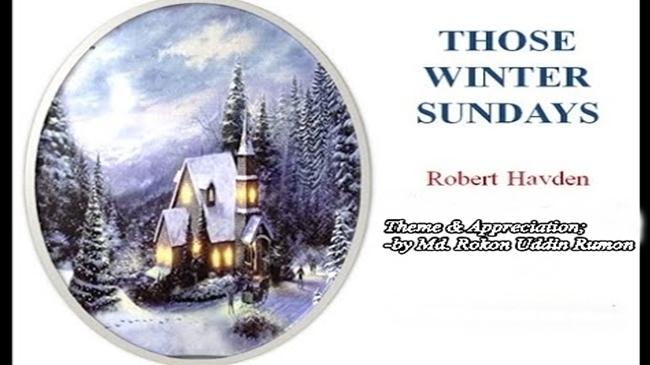Those Winter Sundays- By Robert Hayden
Unit: 6; Lesson: 2
Those Winter Sundays
BY ROBERT HAYDEN
Sundays too my father got up early
and put his clothes on in the blueblack cold,
then with cracked hands that ached
from labor in the weekday weather made
banked fires blaze. No one ever thanked him.
I’d wake and hear the cold splintering, breaking.
When the rooms were warm, he’d call,
and slowly I would rise and dress,
fearing the chronic angers of that house,
Speaking indifferently to him,
who had driven out the cold
and polished my good shoes as well.
What did I know, what did I know
of love’s austere and lonely offices?
সেসব শীতকালীন রোবারগুলো
-রবার্ট হেইডেন
রবিবারেও আমার বাবা ভোরে ঘুম থেকে জেগে উঠত
এবং কনকনে শীতে পোশাক পড়ত,
এরপর ফাটা হাত দিয়ে, যা ব্যাথা করত
ছুটির দিনেও ঠান্ডা আবহাওয়ায় কাজ করত
কয়লা কাঠ দেওয়া চুল্লিতে আগুন ধরাত
কেউ তাকে জানাত না ধন্যবাদ।
আমি ঘুম থেকে উঠে হাড় ভাঙ্গা কাঁপানো শীতের শব্দ শুনতাম।
যখন কক্ষগুলো উষ্ণ হতো, তার ডাক শুনতে পেতাম,
আর ধীরে ধীরে ঘুম থেকে উঠে পোশাক পড়তাম,
সে বাড়ির শাশ্বত ক্রোধের শিকার হওয়ার আশংকা করতাম,
আবেগশূন্যভাবে তার সাথে কথা বলতাম,
যিনি শীতকে বিতাড়িত করতেন
আর আমার ভালো জুতাগুলোকেও পলিশ করতেন।
আমি কী জানতাম, আমি কী জানতাম
স্নেহ ভালোবাসার অনাড়ম্বর ও নিঃসঙ্গ দায়দায়িত্ব সম্পর্কে
Theme/ Appreciation
The speaker of the poem realizes from his adult perspective that he took his father for granted. Now in adulthood, he more fully understands what it means to make sacrifice for others. Now, he can look back on his childhood and appreciate the way his father was carrying out his duties and responsibilities. Most children can’t fully appreciate their parents because they haven’t had to be responsible yet for another human being. “Those Winter Sundays” then, has a kind of sadness to it that is equal parts nostalgic and regretful. The speaker knows he can’t travel back in time and show his gratitude to his father, but that he can at least record it in the poem.
or,
Major Themes in “Those Winter Sundays”: Love, regret, and parenthood are the major themes in the poem. The poet provides some glimpses of his father’s struggle. He elaborates how his father used to spend his Sundays dutifully. He takes every pain to bring comfort at home and fulfill his responsibility as a father.
or,
In the poem, an adult speaker reflects on how, when he was a child, his father would get up early on Sunday mornings throughout the winter in order to light a fire and warm up the house before anyone else got out of bed. At the time the speaker failed to appreciate this, as well as the other ways his father expressed affection for his family. Only upon looking back at these memories as an adult does he understand the often selfless and thankless nature of love.

